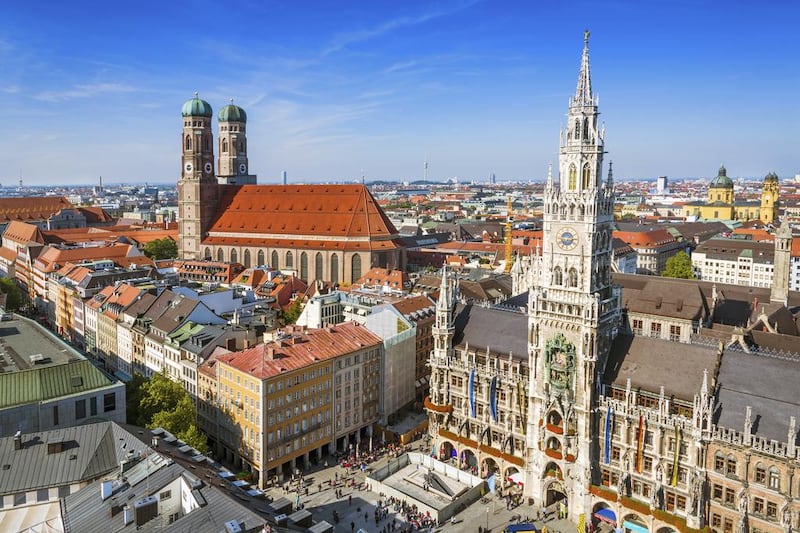Abu Dhabi resident Rashed Alblooshi treks to Munich for the top-notch medical care. He sticks around for the high-end shopping.
“I came to Munich because it has the best orthopedics,” the 35-year-old human resources manager said as he left Cartier, his knee in a brace. “I’m making a holiday of it.”
Mr Alblooshi has been to Munich each of the past seven years and hasn’t visited London, long the traditional haunt of Middle Eastern guests, in 15 years. The visits are lucrative for the city’s merchants - he often brings empty luggage to fill up before he goes home.
Munich - thanks to the city’s medical facilities and array of luxury boutiques - has helped Germany race past France and Britain to become the European destination of choice for tourists from the Gulf states, according to data from Germany’s DZT tourist board. Arab guests spent 1.5 million nights in Germany in 2013, and the board forecasts the total will top 2 million by 2020. More than a third of the Arab visitors went to Munich.
On a 750-metre stretch of Maximilianstrasse, affluent shoppers can frequent luxury stores ranging from Louis Vuitton to Cartier. Guests from the Middle East spend an average of €351 (Dh1,403) a day in Munich, four times more than other foreigners, according to a study by retail consultants BBE.
Such expenditures in Europe used to be the preserve of London and Paris. France’s 2011 public ban on wearing the full face veil coincided with its fall out of the top three holiday destinations for Arabs the same year, while in 2013 the UK slid to second as Germany nabbed the top spot, according to the DZT, which hasn’t yet released 2014 data.
“The veil ban in France killed business in Paris,” said Robert-Jan Woltering, the head of Accor’s Sofitel operations in Germany and manager of its flagship Bayerpost Hotel in Munich. “Our Middle Eastern guests used to go to London, Paris, Geneva. Five years ago Munich and Vienna started to increase.”
The city’s hotels have adapted accordingly. The Bayerischer Hof provides television channels and halal menus in Arabic, as well as calendars with prayer times. Royal princesses can keep their own furniture - sofas or beds - in storage at the hotel when they’re not there.
The efforts have paid off. While guests from the region used to come mostly in August, when temperatures in the Gulf typically exceed 40 degrees celsius, they now come year-round, according to Rifka Aboudi, who manages Arab guest relations at the hotel, where Munich’s annual security conference takes place.
Not only do Middle Eastern guests tend to spend more, they also stay longer. Mr Woltering said that while a typical European visitor might spend two or three nights, those from the Gulf often stay for weeks. The Sofitel Bayerpost welcomed a 30-strong Middle Eastern party in June which stayed through March.
“The hotel industry is very dependent on guests from the Gulf,” said Michael Kerkloh, chief executive of Munich Airport, where expansion of Gulf carriers Emirates, Etihad Airways and Qatar Airways has lifted Dubai, Abu Dhabi and Doha to the airport’s top five long-haul destinations. “The medical infrastructure that’s developed to cater to them is truly amazing.”
Munich is home to hundreds of clinics, specialists and hospitals treating the full spectrum of medical conditions. One of its most famous residents is Hans-Wilhelm Mueller-Wohlfahrt, a former doctor for the Bayern Munich football team whose patients include Usain Bolt, U2 frontman Bono, Michael Jordan and Cristiano Ronaldo. The Sultan of Oman returned home in March after eight months’ medical treatment in Bavaria.
German hospitals and clinics welcomed 35 per cent more patients from abroad in 2013 compared with five years earlier, according to estimates from Jens Juszczak, a scientific staff member at Bonn-Rhein-Sieg University specialising in medical tourism. He estimates their combined annual medical bill is worth €1.1 billion, securing Germany a top spot in medical tourism rankings worldwide.
Germany’s hospitals and clinics have a very good reputation in the Gulf region, where receiving the best perceived treatment is a status symbol, Mr Juszczak said.
That, coupled with Munich’s clean streets and safe environment, sets the city apart from European rivals, said Hamda Al Naimi, a 27-year-old Dubai resident. Germany’s homicide rate is Europe’s second-lowest, according to data from the European Commission.
“Mostly it’s about word of mouth,” said Al Naimi, who has been to Munich three times for medical check-ups. “It’s kind of like Dubai when it comes to cleanliness. It’s a bit classier than other German cities.”
business@thenational.ae
Follow The National's Business section on Twitter






